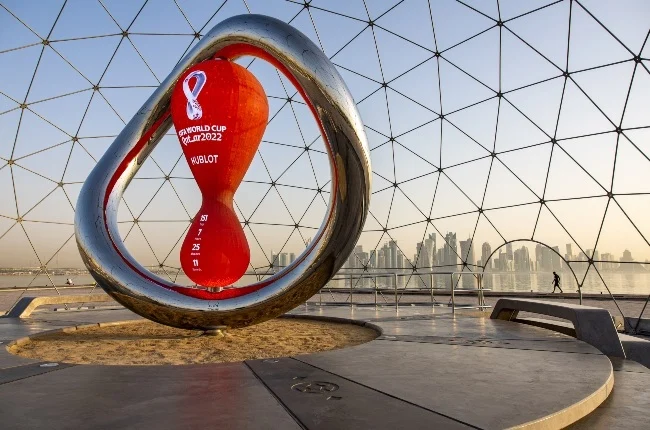With just about two months before the 2022 FIFA World Cup begins in Qatar, calls have mounted for African countries to seek justice for their citizens who have worked in Qatar’s construction and tourism sectors under abusive working conditions.
The tournament which brings together some of the world’s best football talent takes place between 20 November and 18 December, while thousands of African and Asian workers in Qatar allege that they have experienced abusive practices in Qatar’s construction and tourism sectors linked to the World Cup.
Human Rights Watch (HRW), Amnesty International, and other human rights groups have documented abuses such as wage theft, injuries, and unexplained deaths.
One distressing story is that of Samuel Alabi Ago, a failed footballer from Ghana, who is featured in the documentary film The Workers’ World Cup directed by Adam Sobel and produced by Ramzy Haddad and Rosie Garthwaite.
Ago is back home in Ghana after developing pain from using heavy construction machinery and he, like many others, was not compensated for injuries sustained at work.
Then there’s the story of Malcolm Bidali, who upon raising concern about gross abuses in working camps, was taken into solitary confinement by Qatari state security agents on 4 May last year.
His issues raised the alarm on gross human rights violations happening in Qatar.
Ghana, Kenya, and Uganda have the largest contingent of Africans working to make the World Cup a memorable showcase.
In a recent survey by Amnesty International, called YouGov, 93% of respondents interviewed in Kenya agreed that FIFA should provide a remedy for labour abuses behind the World Cup build-up.
The majority in 15 countries where the survey was conducted overwhelmingly want FIFA, with the help of the International Labour Organisation (ILO), to come up with a fund of at least R7.8 billion for reparations.
This figure is relatively small compared to the estimated R102 billion in profit FIFA is expected to make at the World Cup.
“Supporters don’t want a World Cup that’s indelibly tainted by human rights abuses,” said Steven Cockburn, Amnesty’s head of economic and social justice in a statement.
“The past cannot be undone, but a compensation programme is a clear and simple way that FIFA and Qatar can provide at least some measure of redress to the hundreds of thousands of workers who made this tournament possible”.
Ghana, Senegal, Tunisia, Cameroon, and Morocco are the African countries that will take part in the World Cup.
Most of them have sizable numbers of people working in Qatar for the World Cup and HRW has written to their football governing bodies to publicly speak out against the abuse of workers in Qatar, but none has done so as yet.
However, in an unprecedented move, major World Cup sponsor corporations such as Adidas, Budweiser, Coca-Cola, and McDonald’s put out statements in agreement with the HRW-backed #PayUpFIFA initiative.
Adidas was the first to openly speak out and offer its unwavering support for justice to be served.
“Although Adidas was not involved in the decision to award the World Cup to Qatar, we have been working with partners to improve the human rights situation in recent years,” stated William Anderson, Adidas vice-president of global, social and environmental affairs.
ALSO READ: As COP27 looms, Africa receives a 10th of climate financing it needs
“We are supportive of FIFA continuing its close engagement with the advocacy community and with the Building and Wood Workers International (BWI) – the global union that represents the construction industry – to address, together with Qatar’s Supreme Committee for Delivery and Legacy, all and any worker rights issues arising out of the hosting of the 2022 World Cup, including required actions for remediation and, where appropriate, due compensation for workers and their families with unresolved grievances.”
At a press briefing on 20 September, Craig Foster, a retired Australian footballer, announced that he would donate his salary as a broadcaster at the World Cup to families of deceased workers, as well as to LGBTQIA and women’s rights groups in Qatar.
Source: News24

